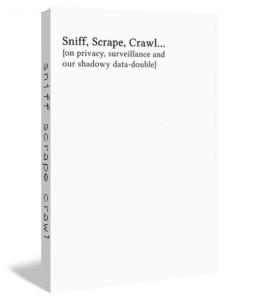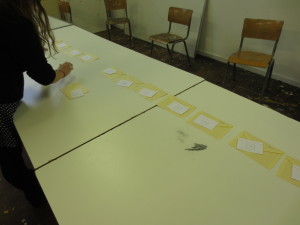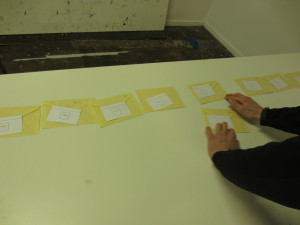Des nouvelles images ici: http://gallery3.constantvzw.org/index.php/Networked-Social
Author Archives: admin
Protocol: Quotes
Protocol: The customs and regulations dealing with diplomatic formality, precedence, and etiquette.
“Protocols are highly formal; that is, they encapsulate information inside technically defined wrapper, while remaining relatively indifferent to the content of information contained within. Viewed as a whole, protocol is a distributed management system that allows control to exist within a heterogeneous material milieu”
(Alexander Galloway, Protocol, MIT, 2004)
“The push to standardize presumes the ability to constrain a phenonemon within a particular set of dimensions that stipulate its outcome. A great deal of work is conducted to make the standard possible, and then this must be followed up by agents committed to implementation and oversight. Again, standardization is a recursive practice, necessarily historical and embedded in a series of complex events and social structures”
(Martha Lampland, Susan Leigh Star: Standards and their stories, Cornell, 2009)
“In outline, the process of creating an Internet Standard is straightforward (…) In practice, the process is more complicated, due to (1) the difficulty of creating specifications of high technical quality; (2) the need to consider the interests of all of the affected parties; (3) the importance of establishing widespread community consensus; and (4) the difficulty of evaluating the utility of a particular specification for the Internet community.”
http://tools.ietf.org/html/rfc2026
«I expected all kinds of data formats to exist on the Web. I also felt there had to be one common lingua franca that any computer would be required to understand. (…) The art was to define the few basic, common rules of “protocol” that would allow one computer talk to another, in such a way that when all computers everywhere did it, the system would thrive, not break down.»
(Tim Berners Lee, Weaving the web, 1999)
«Control is not exerted externally by force, but instead exploits the already emergent behaviour in the system. The self-organization of individual agents in the network seems to give the freedom to act, but in reality local exceptional rules are present that compromise their actions. (…) How to rupture the relations between acting and being acted upon, or between programming and being programmed?»
(Geoff Cox, Speaking Code, MIT 2012)
TODO jeudi 31 octobre
Publish the results of your S + 7 experiment on this blog. Add the keyword “S + 7” to your post.
Please mention the algorithm you applied, the source of the text and the tools you used!
Link to the texts
Link to the Wicktionary
Resources Saison 1
Stakeholders
- Obama and Zuckerberg https://www.youtube.com/watch?v=HnPI7B7ZS9M
- Faceless, Manu Luksch http://www.ambienttv.net/content/?q=faceless
Protocols
- Refresh http://www.nettime.org/Lists-Archives/nettime-l-9610/msg00000.html
- http://reply-all.org/
- Last Wishes
- Disambiguations https://en.wikipedia.org/wiki/Protocol
- Etiquette http://ia600304.us.archive.org/4/items/etiquette_0709_librivox/etiquette_03_post.ogg
- Manners http://www.4chan.org/rules
- History of the internet: http://www.youtube.com/watch?v=9hIQjrMHTv4
- The Well http://archive.org/details/episode_1134
- You Have 0 Friends http://www.southparkstudios.com/full-episodes/s14e04-you-have-0-friends
- Angry Women (Annie Abrahams) https://vimeo.com/33492100
Algorithms
- GiveMeMyData http://givememydata.com/
- https://panopticlick.eff.org/ How trackable is your browser?
Market
Transparency
- sukey http://www.opensukey.org/
- goodiff http://www.goodiff.org
- GiveMeMyData http://givememydata.com/
- Life Sharing http://0100101110101101.org/home/lifesharing/index.html
- I Love Alaska, Lernert Engelberts and Sander Plug (2009) http://www.minimovies.org/documentaires/view/ilovealaska
Datamining
- Kurieniemmi Data Radio http://kurenniemi.activearchives.org/dataradio/
Tagging
- I Love Alaska, Lernert Engelberts and Sander Plug (2009) http://www.minimovies.org/documentaires/view/ilovealaska
- Is it true that… Luna Mauer / Moniker design http://www.youtube.com/watch?v=bC3s36aFKWw
- Vital Statistics of a Citizen, Simply Obtained (1977) http://www.ubu.com/film/rosler_vital.html
Uncategorized
- Delivery for mr. Assange http://bitnik.org/assange/
- A Look Inside / Surveillance Art Exhibition http://www.deburen.eu/nl/programma/detail/tentoonstelling-a-look-inside
- http://ziewitz.org/papers/ziewitz_algorithm.pdf
- Naked on Pluto http://pluto.kuri.mu/
- BITNIK http://chess.bitnik.org/
- Life Sharing http://0100101110101101.org/home/lifesharing/index.html
- http://mattmckeon.com/facebook-privacy
- http://www.laptopreflections.org
- http://suicidemachine.org/
- sukey http://www.opensukey.org/
- Stare, Peter Westenberg (2010) http://activearchives.org/aaa/resources/194
- I’m already falling apart and I haven’t even started, Laura Macchini (2012)
- Dear Steve, Herman Asselberghs
- Michelle Teran http://www.ubermatic.org/?p=1964 (IDA + Nicolae: http://vimeo.com/52685635 + http://vimeo.com/52686825 )
- Revolution OS
- Adam Curtis ALL WATCHED OVER BY MACHINES OF LOVING GRACE (first chapter: love and power http://vimeo.com/27393748) http://www.bbc.co.uk/blogs/adamcurtis/2011/05/all_watched_over_by_machines_o.html
- http://www.stanza.co.uk/projects.html
- The Social Network Screenplay: http://flash.sonypictures.com/video/movies/thesocialnetwork/awards/thesocialnetwork_screenplay.pdf
- Albertine Meunier My Google Search History http://www.albertinemeunier.net/google_search_history/google_search_history.htm
- My Fair Lady, George Cukor http://en.wikipedia.org/wiki/My_Fair_Lady_%28film%29
- North by Northwest, Alfred Hitchcock http://en.wikipedia.org/wiki/North_by_Northwest
- Ine Poppe Hippies from Hell http://www.journeyman.tv/12542/documentary-films-archive/hippies-from-hell.html
Sniff Scrape Crawl
Le Piet Zwart Institute, Rotterdam a récemment publié le livre: Sniff Scrape Crawl – on privacy, surveillance and our shadowy data-double:
“Today, the border between the public and private is porous. Unlike the ominous spectre of surveillance depicted in George Orwell’s Nineteen Eighty-Four, current methods of information gathering are much more subtle, ‘friendly’, and woven into the fabric of our everyday lives. Customer cards give instant access to discounts, while shopping habits are simultaneously registered. Through behavioural tracking, Amazon tells us which books we might like, Google uniquely tailors its advertising and search results, and Last.fm connects us to people with similar music tastes. Immersed in social media, we commit to binding contracts and agree to ‘terms of use’ that would baffle a lawyer, if anyone actually bothered to read the legalese. Nonetheless, having sealed the blind deal with a click, we Twitter our subjectivities in less than 140 characters, contact our long lost friends on Facebook, and mobile-upload our geotagged videos on YouTube. Where once surveillance technologies were associated with the agencies of the government and the military, the web has fostered a participatory and less optically driven means of both monitoring and monetizing our intimately lived experiences”
(Sniff Scrape Crawl contient des textes de Nicolas et Seda, et bien d’autres )
Ce publication est disponible gratuitement pour les participants au Networked Social. Trouvez votre exemplaire à Constant, Fortstraat 5, St. Gillis (lundi-mardi 09:00-17:00 et mercredi 09:00-12:30)
Round-up notes
Tuesday 19 March: (De)centralized practice
<strong(De)centralized practice
An afternoon of short presentations and discussion with Diana McCarthy, Reni Hofmueller, Seda Guerses and Femke Snelting
Diana, Reni, Femke and Seda are part of communities that envision new ways of collaboration or practice using networks. Part of these pursuits entails building alternative tools and reconfiguring networks using open and decentralized solutions, and nurturing a sharp culture of critique of centralized or proprietary services.
In this line of practice, dichotomous thinking may prevail. We may at times even use it to fuel our political/creative/alternative projects e.g., free vs. proprietary in the 90s, and centralized vs. distributed in the age of social media.
Yet, these dichotomies may become passé and even turn unproductive. How can we venture into undoing these dichotomies in order to take a critical look at our work, rethink and re-present its remarkable history, and identify the potentials of our “alternative networks” beyond these dichotomies?
This afternoon is jointly organised with the the Piet Zwart Institute’s Master Media Design and Communication, Ecole de Recherche Graphique, Brussels (The Networked Social ) and Institute of Networkcultures (Unlike Us http://networkcultures.org/wpmu/unlikeus)
The afternoon starts at 14:00 at the Piet Zwart Institute, Master Media Design & Communication. Karel Doormanhof 45, 3012 GC Rotterdam, The Netherlands
with:
Diana McCarty
Diana is a founding member of the radia.fm network of cultural radios, a network of radio stations that support citizen media. they made a content exchange platform between the radio stations, networking their audiences/makers. she can contribute to the question of what makes an “alternative” social network and how you can use existing (social/digital/analog media) to do it.
Reni Hoffmueller
Reni is an artist, she worked on mur.at an project with started with the then novel goal of providing its user base (mostly artists) with free web services. that was the alternative platform of 20 years ago, before “free” services took over. nevertheless, mur.at exists. what does it mean for your vision to get hi-jacked? and, how do you sustain your alternative social networks? are questions that she can talk about extremely well.
Seda Guerses
is a researcher working in the group COSIC/ESAT at the Department of Electrical Engineering in K. U. Leuven, Belgium. She is interested in the topics of privacy technologies, participatory design, feminist critique of computer science, and online social networks. Seda is particularly excited about the topic of anonymity in technical as well as cultural contexts, the spectrum being anywhere between anonymous communications and anonymous folk songs. Beyond her academic work, she also had the pleasure of collaborating with artistic initiatives including Constant vzw, Bootlab, De-center, ESC in Brussels, Graz and Berlin. http://www.esat.kuleuven.be/~sguerses
Femke Snelting
Femke Snelting is an artist and designer, developing projects at the intersection of design, feminism and free software. She is a core member of the Brussels based association for arts and media, Constant. Femke co-initiated the design- and research team Open Source Publishing (OSP) and formed De Geuzen (a foundation for multi-visual research) with Renée Turner and Riek Sijbring. Currently she coordinates the Libre Graphics Research Unit, a partnership of four European medialabs to investigate interrelations between tools and practice. http://snelting.domainepublic.net/
Warung Mini
“Waar lekker eten niet duur is.”
Quick Sort
hello world and cpdp on the 24. of january
dear participants of the networked social,
it was very nice meeting you today and we look forward to our next sessions.
i am ccing femke and nicolas in this email, so that you now have all of our email addresses.
i am also sending you information about our visit to the “computers, privacy and data protection conference” on the 24. of january from 9am-12pm. the event takes place at les halles in schaerbeek.
you can find all information about the conference here:
http://www.cpdpconferences.org/
you can find the program of the day here:
http://www.cpdpconferences.org/thursday24january2013.html#top
you can find instructions on how to get to les halles here:
http://www.cpdpconferences.org/Resources/CPDP2013_Howtogetthere.pdf
we will meet at 9am at the main entrance. femke and i (seda) will pick you up and we will do the rounds till 12pm.
you can attend any of the sessions (see the program and notice there are three different rooms), meet people, ask them questions, and document your observations for your diary (pick your media of liking).
femke will brief you again shortly on thursday. if you have any questions, please ask per mail or otherwise.
wishing you a nice week and look forward to seeing you again.
best,
s.




